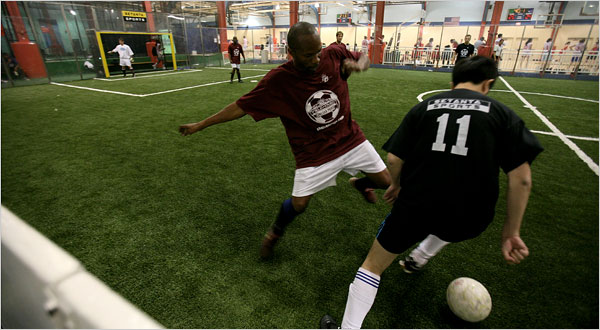Homeless Soccer Team Roots for New Life
Homeless Soccer Team Roots for New Life By JULIE BOSMAN The scruffy players in brick-red jerseys and secondhand shoes hailed from Chris Lodgson yells encouragement. “It makes me feel like myself again,” he said of soccer. Most of the players in black work together at the Royal Bank of They faced off the other night at Chelsea Piers, perhaps The idea behind homeless soccer is something like this: Take a group of poor people, disconnected from the regular rhythms of life, lacking both physical exercise and much to look forward to. Add soccer. In “When I’m out there, I feel like I can’t do any wrong,” said Dexter Burnett, 47, who played soccer in his native The league is the brainchild of Lawrence Cann, 31, once a nationally ranked soccer player at Davidson College, who moved in the fall from Charlotte to New York, which had no established homeless soccer team despite having one of the nation’s largest homeless populations, estimated at 35,000. With the help of a few volunteers, Mr. Cann cleared out a dusty gymnasium that had been used for storage at the shelter on At an early practice on a rainy night in March, a couple of the 15 people standing expectantly in a circle had evidently been drinking. Most spoke little English. And they did not even know one another’s names. “Hey, you,” one player called out before kicking a clumsy pass that landed far from its target. Taking note, Mr. Cann imported a drill familiar to early practices of soccer teams everywhere: Before making a pass, the kicker had to call out the name of the receiver. He gave instructions in English and Spanish. He declared that anybody who showed up drunk or high would not participate that night (but could return the next week). And between running, passing and shooting, players are expected to talk to the coach about their goals outside soccer, their job searches and their state of mind. Of the 30 people who have turned out for a practice, only six have not returned a second time. “You need something to occupy your time around here,” said Woods Matthews, 45, a regular whose long braid swings when he plays. “That’s why people get so mad around the shelter. We don’t get any exercise, we’re all cooped up, and then people get in fights.” As the players on the team, Street Soccer NY, smoothed their ragged edges, Mr. Cann began to look for opponents. Chelsea Piers, with its state-of-the-art facilities, is among the city’s most expensive places to play — $2,450 per team for 10 games — and normally has a waiting list of more than 25 teams. But the bad economy led a lot of corporate-sponsored teams to drop out. Mr. Cann raised the entry fee, Nike donated equipment, and Chelsea Piers provided matching jerseys, as it does for all the teams that play there. Just getting to the field is a 70-minute trek: the M35 bus to The homeless players lost their debut game, 14-4, playing without a single substitute. The next week, they faced a team from Bloomberg, the financial information company, whose players were politely intrigued. “I guess I figure being homeless, they’ll play pretty aggressively,” predicted Louis Brun, 22. Street “If these guys can get out there, feel comfortable talking to new people, and not get frustrated, then it’s really going to help them integrate,” Mr. Cann said. “Then eventually they’ll keep jobs and not get kicked out of their apartments.” He is already seeing progress: One player left the shelter and returned to his family. Another, Jarvis Strose, who had refused to meet with caseworkers and regularly missed curfew over two years of homelessness, arrived promptly at practice every week. A caseworker told Mr. Cann that a third man, who had developed a nervous disorder after being beaten in prison, was beginning to recover from his trauma because of the exercise. On Tuesday, Street Soccer NY met the team made up mostly of Royal Bank of “I don’t want to say it’s a return to being normal, but it makes me feel like myself again,” he said. “Two weeks ago, that was, like, the first time in a while that I forgot. I forgot where I was and what was going on.” The red team took an early lead, passing fluidly, players calling one another by name. Players from the adjacent field wandered over to watch. “Is that the homeless team?” asked one. “Wow,” he said, cocking an eyebrow. “They’re good.” Mr. Strose scored his fourth goal of the game, panting with exhaustion as he ran off the field. When Mr. Matthews, sent in to substitute, kicked for a goal but missed the ball entirely, his teammates shouted encouragement. “When we started, they didn’t know how to play,” Mr. Cann said. “They didn’t know how to pass. They didn’t trust each other.” Final score: Homeless 10, Bankers 4. Mr. Cann, surrounded by celebrating players, looked relieved. “We really needed a win,” he said. Still clapping, he called out to his team, “Shake hands!” 










